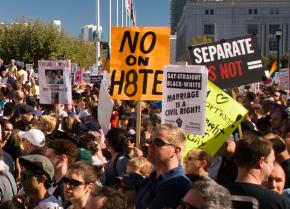At stake in the challenge to Prop 8
looks at the backdrop and the potential consequences of a looming California Supreme Court decision on Prop 8.
THE CALIFORNIA Supreme Court began hearing testimony March 5 in a lawsuit aimed at overturning Proposition 8, a ballot initiative to ban same-sex marriage in California that passed last November. The court has 90 days from the hearing date to rule on the challenge, which was initiated by two groups of same-sex couples and a number of municipal governments, led by San Francisco.
When it comes, the court's judgment will have an impact not only on 18,000 same-sex couples, but on the next steps for the fight for equal rights for lesbian, gay, bisexual and transgender (LGBT) people.
Hundreds of supporters of gay marriage turned out as the hearing began in San Francisco, with many people watching the proceedings on a Jumbo-Tron screen outside.
On the eve of the hearing, a thousand people marched against Prop 8 in San Francisco's Castro neighborhood. "Taking away a civil right we had is a violent act," Stuart Milk, nephew of the late San Francisco Supervisor Harvey Milk, told the crowd. "As Harvey would say, when you let the majority deprive the minority of their civil rights, you start a shopping list. Who's next?"
Media reports of the hearing speculated that the Supreme Court might reach a so-called compromise decision, in which it would uphold the 18,000 marriages conducted while gay marriage was legal, but also uphold the ban on equal marriage rights put in place by Prop 8.
All seven justices appeared to back recognizing the unions of the thousands who were married while same-sex marriage was legal. But the possibility that the Prop 8 ban could remain in place is a big disappointment.
The legal challenge to Prop 8 is based on the idea that the referendum stripped a fundamental right from a group that is traditionally underrepresented--by that reasoning, the ban would be a revision to the state constitution, rather than an amendment, and would require approval by two-thirds of the legislature or a constitutional convention to get on the ballot.
Christopher Krueger, a senior assistant in state Attorney General Jerry Brown's office, also argued that individual liberty was at the heart of the court's 2008 ruling affirming gay marriage, and that people's "inalienable rights" should not be subject to a majority vote.
In the opening days, several justices, including Chief Justices Ronald George and Joyce Kennard, who voted with the majority to overturn the previous gay marriage ban in May 2008, appeared to doubt whether these challenges were justified.
For several justices, the argument appears to have come down to the question of choosing between, as Kennard put it, "the inalienable right to marry and the right of the people to change the Constitution as they see fit."
But it's clear that the pro-Prop 8 forces aren't agonizing about anybody's rights. Outside of the courtroom, their protesters gathered with anti-gay signs. Inside, conservative attorney Kenneth Starr, representing the Prop 8 sponsor Protect Marriage, could barely hide his contempt for supporters of equal marriage rights.
State Assembly member Tom Ammiano summed up Starr's comments this way: "I felt like he was saying, what are these slaves complaining about? They've got a house to sleep in. What, they want clothes now?"
SOMETIMES LOST in the legal sparring is the very real discrimination that initiatives like Prop 8 codify.
Married couples are entitled to well over 1,000 federal rights that unmarried couples don't have access to--from legal visitation rights or the right to make any decisions on behalf of partners who are incapacitated, to access to benefits like Social Security, Medicare, family leave and health care.
Without equal marriage, LGBT people are condemned to second-class status. This is why overturning bans like Prop 8 are too important to be left to the lawyers alone.
Prop 8 passed by a slim 52 to 48 percent margin. The outcome would have been different had there been an unapologetic, public and confident campaign to defeat it. That kind of movement is in the making--among the tens of thousands of people who took up the fight for same-sex marriage and equal rights for LGBT people in the wake of the passage of Prop 8.
Significantly, solidarity has been a key feature of the struggle, as people who may not have any immediate stake in the right for gays and lesbians to marry saw this was their struggle, too, and joined in the fight.
"The key here is changing social attitudes," Rick Jacobs, cofounder of the Los Angeles-based Courage Campaign, told the Associated Press. "It would be nice if the Supreme Court comes out with a favorable decision, but we have to go do the work ourselves. That is the real lesson of this."
Building solidarity and spreading the word about the importance of taking up this struggle will continue to be key if we are to overturn California's Prop 8 and take on the federal government's own anti-gay law, the Defense of Marriage Act.



